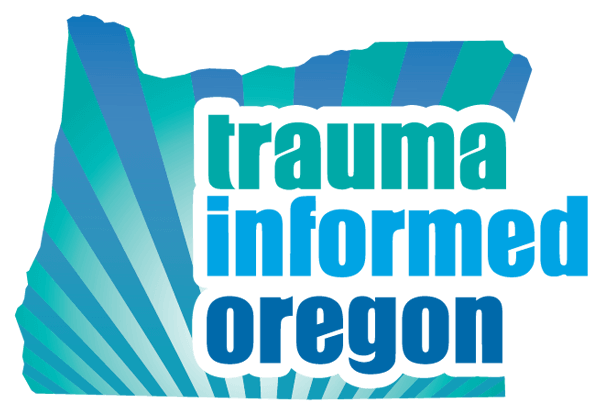Blog
 Valuing of Relationships is Key to Collaboration & Mutuality
Valuing of Relationships is Key to Collaboration & Mutuality

March 3, 2021
From Mandy Davis, LCSW, PhD, Director, Trauma Informed Oregon
This newsletter is focused on the trauma informed principle: Collaboration and Mutuality.
As defined by SAMHSA this principle states:
“There is recognition that healing happens in relationships and in the meaningful sharing of power and decision making. The organization recognizes that everyone has a role to play in a trauma-informed approach. One does not have to be a therapist to be therapeutic.”
There are three pieces of this definition that stand out to me at this moment.
Healing happens in relationships.
We say often that a lot of harm has happened in relationships and needs to be healed through relationships. This means that healing does not happen in isolation – and how we define relationships in this context will be different for each of us. It may be a relationship with a therapist or healer. It may be relationships with friends that support your healing. It may be relationship to your faith or part of the world around you. For young humans we know the resilience provided by a relationship with a caring supportive adult (a parent, teacher, coach, neighbor, mentor, uncle). So how are relationships important for healing? One, is that they give us meaning and help us make meaning out of situations and experiences. Another is that they can bear witness to our experiences so we feel seen, heard, and not alone. Relationships (safe and consenting) also help us learn, explore, and practice how to feel safe, loved, and cared for.
Sharing of power and decision making.
I believe strongly that we need to understand why – with the best information we have at the time. Why is sharing power and decision making an important part of TIC and healing? Because when decisions are made about you – without you they have often resulted in harm and trauma. To prevent harm and to provide effective services and supports we need those impacted by the decisions in decision making positions. Sharing power in most of our spaces is not the norm and there must be deliberate focus on doing this. We need to allow time to practice, evaluate, and evolve as we learn what this looks like to avoid tokenism or setting people up to fail. Decisions can include what Oregon’s health priorities shall be, who gets access to COVID-19 related supports, who gets to work from home, and what providers need to learn. How are you practicing this?
Everyone has a role to play.
One of the reasons I advocate for TIC is because of this truth – that you do not have to be a therapist to be therapeutic and every person has a role. TIO has been able to fund an ECHO project on Trauma Informed Care. Last week the founder of this model spoke about the need to democratize information and education to improve access. This is what TIC is for me. It is about everyone knowing enough to prevent or intervene as able. As my colleague says, Every Moment and Interaction is an Intervention. Realizing that saying hello to someone, picking up spilled groceries, keeping a space clean and safe, all contribute to building resilience. We need all skill sets in this work and I feel energized when someone who thought this was for “mental health providers” realizes how much power they hold to support healing. Who do you recognize is doing the work and who do you not see? Who needs to know what by when to have a part in the work? How do you provide confidence and competence to take part in the work?
I appreciate your experiences applying this principle. I am quite interested in ways to share power authentically and sustainably. Let me know what you are learning.
Helpful Blog Posts
From this newsletter’s contributors, here are some blogs posts that show the importance of Collaboration and Mutuality:
- The Importance of Affinity Spaces – Charlie McNeely
TIO Updates
- Get to know staff and interns:
- Ivon Cabañas is a first-generation Latinx college student and a BSW intern at Trauma Informed Oregon. She is passionate about community outreach and policy work within the Latinx community after graduating this June.
- Morrigan Hunter is an agender and autistic MSW intern at Trauma Informed Oregon. They are really passionate about promoting trauma informed care for the disability community, particularly for survivors of abuse who experience disability. They are also very interested in violence prevention and sexual health equity for the disability community.
- Dana Hafter-Manza is an MSW intern with Trauma Informed Oregon. She is passionate about peer-delivered services, and believes that valuing and uplifting lived experience is a critical component of trauma informed care. Dana lives with her partner, Christina, and their talkative cat, Jelly Roll.
- Des Spicer-Orak is a first-generation queer Palauan poet, who is currently in their final year at Portland State University, and an intern at Trauma Informed Oregon. Des intentionally amplifies the voices of Pasifika communities, as the development of climate crises continue to disrupt island existence and sustenance.
- Working on your survey responses about what would be helpful next.
- Working on e-learning opportunities.
- Working on community resilience as a part of TIC
- Hosted two virtual gatherings: (recording coming soon)
- Adverse Community Experience and Mutual Aid
- TIC: Centering Culture and Healing Practices
To Do List
- Listen to this testimony on the impact of COVID 19 on children and adolescents.
- Read the SOS audit, Child and Family Behavioral Health policy vision draft policy
- Visit and explore the Healthier Together website
- Join ECHO – democratizing knowledge. Trauma Informed Care for Health and Allied Professionals ECHO — Oregon ECHO Network
